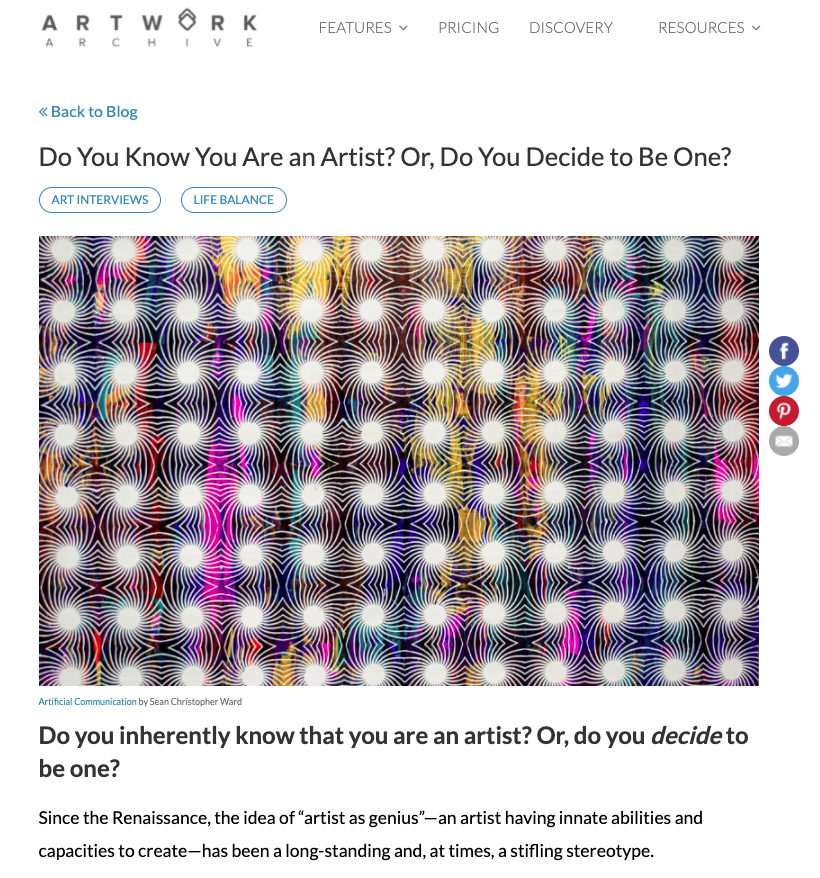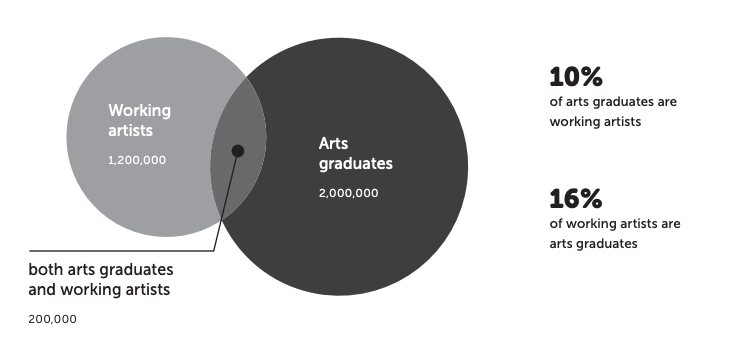Do I have to go to art school to become an artist? ACS data reveals that there are 1.4 million working artists in the world. The number of artists in the United States has increased to over two million, representing 1.4% of the population. U.S. consumers spend an average of $4 per month. It is estimated that about one-fourth of the U.S. labor force is composed of artists-only slightly less than all active duty and reserve personnel. (source by https://artradarjournal.com/art-education/what-percentage-of-the-world-is-artistic/) Above all else, the art market is fiercely competitive. Even if they survive this competition, there are only a few artists who succeed and live without worries. One factor to make it more competitive and leave only minor successful artists is the subjective attribute of the art market. Creativity works positively when you can pour out ideas and strategies that make anything successful. However, the meaning of the word creative is very subjective and sometimes improvised. Therefore, it is sometimes vague and fuzzy when viewed from the other point. Normally, we get confused and anxious when standing in front of a road where the route is not visible. If the course is clear, you can listen to the experiences of seniors or mentors who have gone ahead and followed them. Very simple! But, the subjective and creative path means that you have to pioneer and make it yourself in a word, nobody tells you the exact route. The survey, “A study on the financial state of visual artists today,” was conducted by The Creative Independent, a publication funded by Kickstarter whose mission is to provide support for artists and other creators. More than 1000 self-identified artists took the survey. Of those, only 32 percent said they’d been pursuing art careers for more than ten years. Though people from 52 countries answered the survey, more than 75 percent of respondents are from the United States. The survey reveals how rare it is for artists to earn a living from their artwork alone. It also suggests that having gallery representation or an MFA has little impact on an artist’s financial stability. Just 12 percent of respondents listed gallery sales among their top three income sources, and “being represented by a gallery is usually not a helpful way for an artist to pursue financial stability,” the report said. Art school was seen as helpful in developing an artist’s work, but “earning an art degree does not set artists up for financial stability,” the survey concludes. The survey data also suggests that artists have learned how to make a living primarily on their own or from their peers, not from school or other educational opportunities. “Artists were most likely to credit their relationships and support network as top factors contributing to their financial stability,” according to the report. (Source by https://thecreativeindependent.com/artist-survey/) So, back to the beginning, do I have to graduate from art school to become an artist? Let's ask Does this mean that everyone becomes an artist after graduating from art school? If you ask again, it becomes clear. Can you become an artist just by graduating from art school? In a nutshell, being an artist is not a matter of skill or degree, or talent, it is a matter of identity. If the artist's identity is solid, skills, degrees, talents, and other external factors may all be perfect or one may be lacking. Conversely, no matter how excellent all external factors are, if you cannot continue creative activities, and sometimes copy other people's ideas or drawings, and cannot create your own world of work, you cannot be called an artist. It's like not everyone is an artist just because they make something good-looking. Recently, I read an interest article with the title, "Do You Know You Are an Artist? Or, Do You Decide to Be One?" The blogger interviewed five artists who work with their identity as artists on the assumption that artists are born or that they decide. One of five interviews, the sentences of artist, Lordy Rodriguez was impressive. If you make art, you are an artist. It's not dictated by financial success or professional success. But if you don't make art, then you aren't an artist anymore. The challenging thing isn't how to be an artist. The challenging thing is how to keep being an artist. In other words, there is no formula that you can be an artist if you graduate from an art school. However, if you would like too strict with such a principle, you don't understand what is an art and real situation in the art market. In the report of significant statistics, it announces that most surprising was the lack of overlap between working artists and arts graduates. In the United States, 40 percent of working artists do not have bachelor’s degrees in any field. Only 16 percent of working artists have arts-related bachelor’s degrees. Though arts graduates may acquire additional opportunities and skills from attending art school, arts graduates are likely to graduate with significant student loan debt, which makes working as an artist difficult, if not impossible. We acknowledge that some arts graduates are satisfied with work in other fields, but the fantasy of arts graduates’ future earnings in the arts should be discredited. (Excerpt "A report by BFAMFAPhD, 2014") Instead, if you go to art school because you simply love to learn without expecting any output, your chances of success are high. It is a great opportunity to truly explore your world of work, broaden your horizons, learn professional skills, and expand your network. Source by: A National Study on the Lives of Arts Graduates and Working Artists Go to the result of research If you go to art school, you have a high possibility of becoming an artist because of the excellent faculty, curriculum, and network. Even if you go to such a place, if you do not constantly find your identity as an artist on your own and create a world of art, you may graduate and be left with nothing. And the best thing about graduating from art school is that it's easier to prove yourself. Above all, if the university has a brand value, it becomes even easier. At some point people will recognize whatever you draw. In whatever way, there is also the paradoxical nonsense that the identity of an artist can be easily obtained because of the idea that a diploma is a certificate to be an artist. In short, it is a double-edged sword. Most important factor is that it is up to you to become an artist, to have an identity as an artist, to create your own art world, and to survive as a niche market in a highly competitive world. If you have a degree and want to teach or engage in education, it is a good idea to go to art school. In that regard, I also consider institutional education. One thing is for sure, there are many styles of artists in the world, and since the path of an artist is a way that must be thoroughly contested with works that do not require any documents, you must constantly create works. Like Monet, who painted only ponds in own garden for 46 years, like Cézanne, who one day quit the splendid Parisian life and went to Mont Sainte-Victoire to paint only mountains for a long time, it seems that the path of an artist is the way to sincerely pursue the authenticity of the world. In this passage, you can see why they could be great masters. In this way, pursuing the essence and authenticity of things, and creating my own world comes first. And next probably, according to the occasions, it needs another accessories. If you work hard to create art, build your own world, and communicate with people who recognize it, perhaps you will come across yourself as an artist all of a sudden someday.
0 Comments
Leave a Reply. |
Myungja Anna KohArtist Categories
All
Archives
July 2024
|
Proudly powered by Weebly




 RSS Feed
RSS Feed